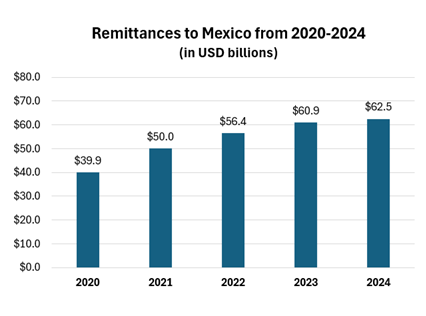As if the news coming out of the U.S. wasn’t bad enough already, I am sorry to pile on. If you’re living abroad and rely on U.S.-based funds to pay for expenses, your taxes are going up.
Why?
Because of the new U.S. remittance tax signed into law a few weeks ago. Earlier versions of the Republican legislation gave anyone with a Social Security number the option to request a refund of remittance taxes paid on their annual tax return. But no such provision exists in what Congressional Republicans passed and Donald Trump signed into law on July 4, 2025.
NOTE: On July 26, 2025, we published an update to the original article, based on new information published by the tax experts LWM consulted for this post.
Which Money Transfers are Getting Hit with a Remittance Tax?
Beginning on January 1, 2026, every time you wire or transfer cash, a cashier’s check, or money order to Mexico from the US, you will pay a 1% excise tax on the transaction.
U.S. citizens, green card holders, and even non-citizens sending money abroad from a U.S. account are responsible for paying the new tax. It will hit a wide range of people moving money across borders for all sorts of reasons, including Mexicans living abroad sending money back to their families in Mexico, a U.S. reetiree sending themselves money to pay rent in Puerto Vallarta, a U.S. citizen wiring funds to buy property in Mexico, and even someone sending money to a foreign charity from a U.S. account.
Unlike most taxes you pay, this tax occurs on money that may have already been taxed. So now, on top of the usual transfer fees and exchange rate margin, you will be paying a 1% tax to the U.S. Treasury every single time you move money across borders.
Which Money Transfers are Exempt from the Remittance Tax?
Transfers using funds from a credit or debit card issued by a U.S. bank are exempt from the remittance tax. Fund transfers from financial institutions covered by FDIC insurance will not be taxed either. This includes ACH, wire transfers, or app-based remittances.
These don’t meet the government’s definition of a “physical instrument” of money, which is the target of the tax, and the type of money most often sent by immigrants living in the U.S. to their families back home.
Actual cash also happens to be what Americans living abroad most often send to themselves to fund their living expenses.
When is the Remittance Tax Paid?
The sender always pays the tax on their outbound transfer, not the recipient. And if you’re the person on both sides of the transaction (i.e., you’re moving money between two accounts that you own), you’re still paying it.
It applies whether you remit cash electronically via a bank or money transfer service like Wise (99% of remittances now happen this way) or send physical cash via a service like Western Union.
Is The Remittance Tax Just for Fat Cats?

Definitely not. There is no income threshold to qualify for the tax.
Whether a billionaire or a humble farm worker, you’ll have to pay this tax when sending money abroad.
Are There Tax Credits for U.S. Citizens to Get Their Money Back?
As noted above, this provision was struck from the final bill signed into law. According to tax experts, the IRS has not clarified who might be eligible for a credit on their annual tax return, despite there being multiple international treaties to prevent U.S. citizens from double taxation.
Because of the uncertainty, one thing those with a U.S. Social Security number should do is to document all of their international money transfers starting January 1, 2026. This ensures that you have a paper trail on remittance taxes paid, should Congress see fit to remedy this dumb new tax on American citizens living abroad.
What Can Americans Living Abroad Do About It?
At this point, not much, unfortunately. If that ticks you off, well, welcome to the club.
You could complain to your Congressperson that U.S. citizens shouldn’t have to pay taxes on international money transfers. But keep in mind that this person already voted for this or has no political power to reverse it (i.e., are Democrats).
Either way, it’s food for thought in the upcoming 2026 mid-term elections. Feeling like registering to vote for next year’s elections? You can do it here.
And if you’re thinking… Well, I’ll just smuggle a bunch of cash in my suitcase when I fly back and forth, or put some currency in my car when I head south next year. If that’s your plan, I have some bad news.
The legal limit for carrying physical currency across borders is USD $10,000. Plus, you’ll still eventually have to convert those dollars to pesos, since virtually no one in Mexico accepts USD as payment without a hideous surcharge.
But the biggest obstacle (apart from the impracticality) is that exchanging physical cash in Mexico typically involves much higher transaction fees than converting funds electronically. So either way, you lose.
How Big a Deal is the Remittance Tax for Mexico?

Last year, remittances from the U.S. to Mexico hit a new record, totaling USD $62.5 billion, representing 96% of remittances to Mexico from all countries.
Starting next year, millions fewer USD will be headed south due to the new tax. The states that have historically received the largest share of remittances are Guanajuato, Michoacán, and Jalisco, so these states will be disproportionately harmed by the new law.
With this change coming on top of all the tariff mayhem, I’m starting to think Trump deserves the title of “tax king” because he seems to love taxes so much — as long as he’s not the one paying them.

